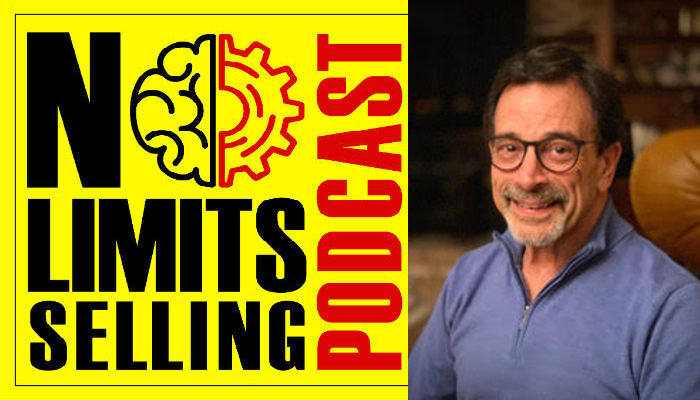4 Amazing Ways to An Empathetic Approach to Problem Solving
On Episode 198 of The No Limits Selling Podcast, we have Stanley (Stan) Wyner, CMS, a principal and founder of Stanley A. Wyner & Associates, LLC, based in Williamsville, NY.
Stan’s career has consisted of both public and private company experiences. Public company experience includes working for such companies as AT&T, Cellular One, and CBS-Viacom. Private company experience includes running firms in staffing, home improvement manufacturing, and commercial lighting, including several multi-generational family businesses.
Stan has been a Vistage Chair with two Vistage groups since 2007, earning multiple Chair Excellence Awards and the prestigious Master Chair title in 2013. Stan added Mental Fitness (Positive Intelligence) Coaching to his practice in 2020. He has proven expertise in Executive coaching, business consulting, strategic planning, sales and marketing planning and management, acquisitions and divestitures
Stan received his BS/BA from Temple University and his Certified Master Sales diploma from Certified Marketing Services International. He is a longtime member of the Rotary Club of Buffalo, and has served on the boards of several local charitable and business organizations. Mr. Wyner enjoys singing in his band, playing the guitar, ice hockey and motorcycling. He lives in Williamsville, NY along with his two dogs and a cat.

Contact Stan:
[EDITOR’S NOTE: This podcast is sponsored by No Limits Selling. It is a fun, fast-paced podcast that delivers hard-fought business advice that you can implement today to improve your sales and performance]
Interested In Our Real Estate Coaching Services? Explore Our Website: Link
Feeling Not Well Today? You Can Use Our Mindset Boosters App To amp Up Your Mood: Link
Find us on Social Media:
LinkedIn | Facebook community | Instagram
Like what do you listen to? Subscribe to our podcast!
Ready to become fearless? We can help you become fearless in 60 days so you accomplish more in your career Schedule A 15 min Call with Umar
Summary
Introduction and Background
Stanley Wyner, a seasoned professional in the field of sales and marketing, shares his insights and experiences in this podcast. He is the principal and founder of Stanley A. Wyner & Associates, LLC, a firm based in Williamsville, NY. With his vast experience, Stan has developed a unique perspective on the dynamics of sales and marketing.
The Importance of Understanding Customer Needs
Stan emphasizes the importance of understanding customer needs in the sales process. He believes that salespeople should not just focus on selling their products or services, but should also strive to understand their customer's needs and provide solutions that meet these needs. This approach, according to Stan, leads to more successful sales and satisfied customers.
The Role of Empathy in Sales
Stan also discusses the role of empathy in sales. He explains that empathy allows salespeople to connect with their customers on a deeper level, which can lead to more effective communication and a better understanding of customer needs. Empathy, according to Stan, is a crucial skill that every salesperson should possess.
The Power of Active Listening
Active listening is another key topic that Stan discusses in the podcast. He believes that active listening is a powerful tool that can help salespeople understand their customers better. By actively listening to their customers, salespeople can gain valuable insights into their customer's needs and preferences, which can help them tailor their sales approach accordingly.
The Value of Persistence in Sales
Stan also talks about the value of persistence in sales. He shares his belief that persistence is a key factor in achieving success in sales. According to Stan, salespeople should not give up easily when faced with challenges or rejections, but should instead persist and continue to strive for success.
Conclusion
In conclusion, Stanley Wyner, a seasoned sales and marketing professional, underscores the importance of a customer-centric approach in sales. He emphasizes that success in sales is not merely about selling products or services, but about a deep understanding of customer needs, empathy, active listening, and persistence. By understanding customer needs, salespeople can provide solutions that truly meet these needs, leading to successful sales and customer satisfaction. Empathy allows for a deeper connection with customers, facilitating effective communication and a better understanding of their needs.
Active listening, on the other hand, provides valuable insights into customers' preferences, enabling salespeople to tailor their approach accordingly. Lastly, persistence is key to overcoming challenges and rejections in the sales process. These elements, according to Wyner, are the cornerstones of successful sales and customer satisfaction.
Questions & Answers
Who is Stanley Wyner?
What is Stan Wyner's approach to sales?
Why is understanding customer needs important in sales?
What role does empathy play in sales?
How can active listening benefit salespeople?
Why is persistence important in sales?
What are the key takeaways from Stan Wyner's podcast?
Don’t miss this opportunity to transform your real estate career with one-on-one coaching. As an experienced real estate coach, I, Umar Hameed, am dedicated to helping you unlock your full potential and achieve your real estate goals. To learn more about who am I and my clients ↓
If you’re ready to take the next step, book an appointment with me today and begin your journey toward success in the real estate industry.
